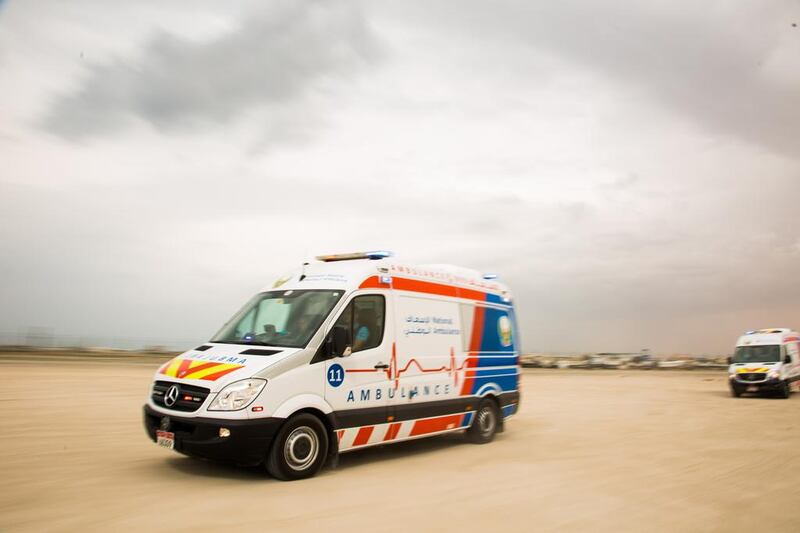ABU DHABI // Ambulance response times in the Northern Emirates have been cut by more than half since services there began two years ago.
In that time, National Ambulance has handled 89,000 calls to its dedicated northern hotline and sent its 50 ambulances out tens of thousands of times.
“No one has done anything like implementing a service like this,” said Robert Ball, chief executive of National Ambulance. “It is unique in the region and I think it is unique globally.”
When the service began operations on February 24, 2014, the average response time in the Northern Emirates was 18 minutes and 12 seconds.
That has been reduced to eight minutes and 56 seconds.
“Our performance is comparable with leading ambulance services in other countries,” said Mr Ball. “In the UK they reach 75 per cent of their calls within eight minutes, while we are reaching 90 per cent of our calls within eight minutes.
“However, it is important to note that response times are not the only area to focus on. Being able to treat a patient correctly and transport them safely is our principle concern.”
He said the 998 emergency ambulance number that came online in May last year had significantly improved the service.
Previously, those needing an emergency response would call 999 and be connected with the National Ambulance service’s control room. Now Northern Emirates residents have their own line.
“More than 75 per cent of the calls we now receive come via 998 and we expect this number to increase over the next 12 months,” Mr Ball said
Saif bin Safwan, an Emirati resident of Ras Al Khaimah, is all too ready to testify to the effectiveness of the new service.
Two months ago his wife was found by their son, unconscious on the bathroom floor.
“My boy called to tell me that his mother was lying down on the floor in the bathroom. My boy thought his mum was dead,” said Mr bin Safwan, chief executive and managing director of the Leon Holding Group.
“I immediately called 998 and within seven minutes they were inside my house, and within 15 minutes she was in a hospital with the emergency care she needed.
“The staff did not simply hand her over to hospital staff. They didn’t leave until they made sure she was stable and all was OK.
“They worked alongside the hospital staff and even accompanied her when she was moved from one room to another. I felt they were not just going through the motions of their job. They really cared. I am really impressed with the service we now receive in the Northern Emirates.”
When asked what the biggest achievements had been over the two years, Mr Ball said it was the daily efforts of every member of staff.
“Whether they work in finance, IT, admin, they are still helping the guys on the front line to save lives,” he said.
Ahmed Al Hajeri, deputy chief executive of National Ambulance, said that in two short years the ambulance service had risen to the challenge to improve emergency pre-hospital care.
“We have expanded our service provision to ensure the community receives the highest level of patient care at the times when it is needed most,” Mr Al Hajeri said.
“The activation of the 998 number and our participation in vital emergency response exercises, alongside our partners in the public emergency services, has established National Ambulance as a key contributor to public safety.”
There are many plans in the pipeline to further enhance the National Ambulance service this year, including the introduction of Electronic Patient Care Records (EPCR) in the next month to switch for a paper-based system to being fully digital.
The EPCR can access a patent’s Emirates ID and ensures more accurate information is recorded. It will be a more efficient system to process a patient when he or she is admitted to a hospital, said Mr Ball.
“This year we will also really be focusing on engaging with the community,” he said.
“We are looking for new and innovative ways of communicating with the community. The more interaction we have with the community, the more it will allow them to understand what we do.”
newsdesk@thenational.ae





